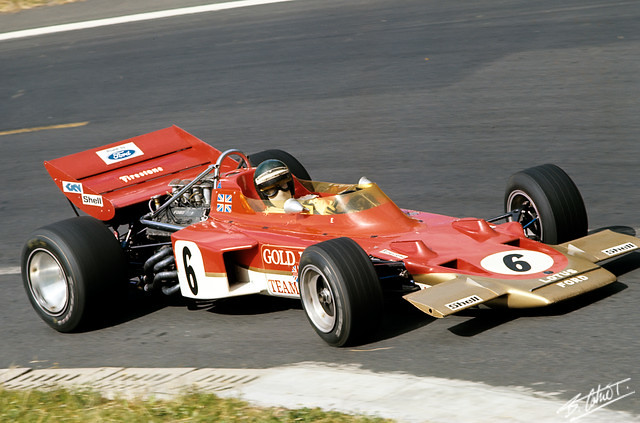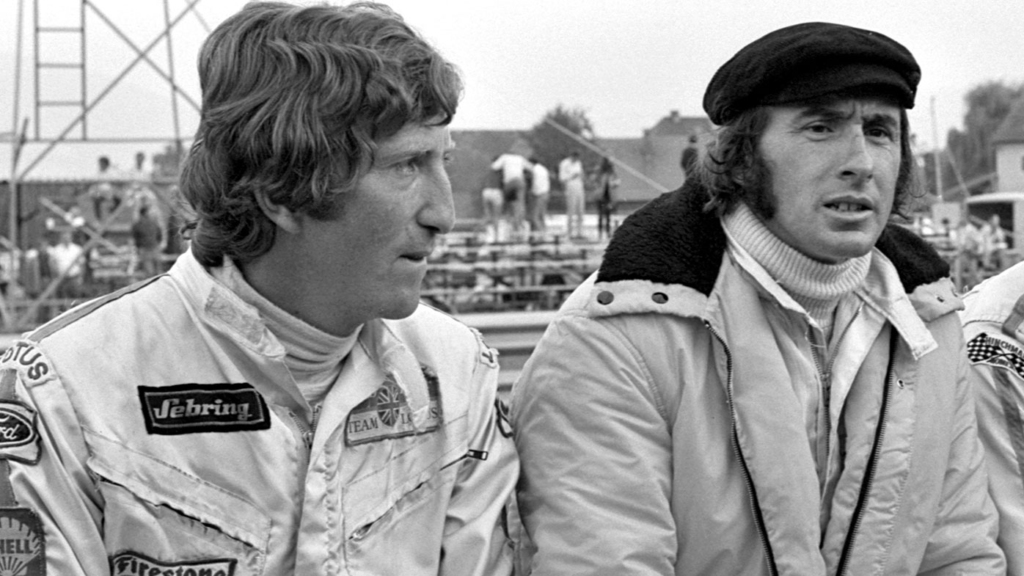Jochen Rindt entered the history books as Formula One’s only posthumous World Champion in 1970. His tragic death during practice for the Italian Grand Prix that year occurred when he held an unassailable lead in the championship standings. The term “posthumous” refers to an honor or award given after someone’s death. Even though Rindt did not live to receive the championship trophy himself, his performance over the first half of the 1970 season made him uncatchable in the points table by the time of his fatal accident.
Rindt’s Early Racing Career
Born in Germany in 1942 but raised in Austria, Jochen Rindt’s parents were killed during World War II. He started racing in the early 1960s, working his way up from Formula Junior into Formula Two and Formula One by 1964. Rindt made his F1 debut at that year’s Austrian Grand Prix but did not race again until signing with Cooper for 1965.
Driving the underpowered Cooper-Climax and Cooper-Maserati cars, Rindt struggled to score points over three seasons. His best result was 3rd place in the 1966 Drivers’ Championship. Rindt also raced sporadically in Formula Two, winning the 1965 London Trophy, and scored an overall victory at the 1965 24 Hours of Le Mans partnered with Masten Gregory.
The Lotus Years
Rindt’s breakthrough came upon joining Lotus in 1969. Although he failed to finish seven of the ten races that year, he took his maiden Grand Prix win at Watkins Glen late in the season and finished 4th in the standings. For 1970, Lotus debuted their revolutionary new Lotus 72 car. Rindt put the 72 on pole position in its first two races but retired from both. He then earned an unlikely win at Monaco in the old Lotus 49 before returning to the 72.
Dominant Midseason Run
From the Dutch Grand Prix in June through the German Grand Prix in August, Jochen Rindt was unbeatable. He won four consecutive races in the 72, mastering the car’s handling and braking performance. His charge included a dominant victory at Zandvoort and a last-lap pass on Jack Brabham to win the British Grand Prix when Brabham’s car ran out of fuel.
This midseason run, with additional retirements for Jacky Ickx and other championship contenders, gave Rindt a strong lead in the points table. Even with four races left, it appeared his first world title was now almost guaranteed.
Death at Monza
Formula One arrived for the Italian Grand Prix at the daunting Monza circuit, known for its long straights encouraging high speeds. Looking to reduce drag on the straights, both Lotus drivers (Rindt and John Miles) removed the rear wings from their 72s in practice on the advice of team boss Colin Chapman.
On September 5, 1970, during the final practice session, Rindt’s wingless Lotus suddenly veered left under braking for the Parabolica corner and crashed into the barrier. The higher straight line speed led to increased braking forces, apparently causing a brake shaft failure. Tragically, a joint in the barrier gave way on impact and Rindt died instantly due to the buckle of his safety harness slicing into his throat.
Rindt became Lotus’s second team leader to die in two years after the death of Jim Clark in 1968. His good friend and business manager Bernie Ecclestone took possession of Rindt’s helmet and a shoe missing from Rindt’s foot, poignant reminders that his death at age 28 robbed the sport of one of its most spectacular talents.
Posthumous World Champion
At the time of his death, Jochen Rindt had amassed 45 championship points from five Grand Prix victories. His nearest competitor, Jacky Ickx, trailed him by 20 points. Mathematically, the title remained in doubt since eight races still remained on the 1970 calendar.
Remarkably though, Rindt’s Lotus teammate Emerson Fittipaldi won the fifth race after his death at Watkins Glen, preventing Ickx from scoring enough points to catch Rindt. His 45 points stood as enough to clinch the championship, an astonishing achievement in light of his death before the season ended.
Rindt’s widow, Nina Lincoln Rindt, traveled to the United States to accept the World Championship trophy at Watkins Glen, which remains today the only time it has been awarded posthumously in Formula One’s history. While his great talent commanded respect, Rindt’s honor as World Champion would forever be bittersweet.
jochen Rindt’s Wild Driving Style and Personality
Jochen Rindt’s aggressive driving style thrilled fans but constantly worried his teams. He pushed his cars to the limit, sliding through corners in spectacular power slides. Rindt acknowledged that he rarely drove within safe limits. His flamboyant charges often resulted in crashes or mechanical failures.
Passion and Mercurial Behavior
Rindt’s personality matched his bold driving. Passionate and headstrong, he deliberately maintained an unkempt, rebellious image rarely seen in modern racing drivers. His conduct suggests similarities to other legends like Juan Manuel Fangio or James Hunt who succeeded through sheer determination rather than strict professionalism.
Away from the track, Rindt indulged in skiing, motocross, and high stakes card games. His mercurial tendencies caused frequent clashes with Chapman, who preferred innovation to stability in car design. Their partnership only thrived once Chapman provided Rindt with a dominant chassis in the form of the Lotus 72.

Love of Life and Racing
For all his flaws, Rindt channeled an infectious love of racing and life itself. His passion to succeed in Formula One was so intense that he turned down an offer to partner Jackie Stewart at Matra in 1969. He wanted the number one seat at Lotus alongside Graham Hill instead, recognizing it as his best chance for the World Championship.
Tragically, Rindt agreed to retire from Formula One after clinching the title in 1970 at Nina’s request, hoping to start a family away from the dangers of racing. He was already building a life with Nina and their daughter Natasha before his untimely end. We can only wonder if walking away from F1 would have satisfied Rindt for long given his restless character.

Lasting Legacy
Jochen Rindt’s Formula One career lasted just over five full seasons from mid-1965 through 1970. In that time, he earned six Grand Prix victories, 13 podium finishes, and 10 pole positions. His posthumous world title after only 45 championship points underscores his stunning talent.
While other drivers have lost their lives on the track since 1970, Rindt remains the only F1 champion crowned after death. His wife Nina helped keep his legacy alive as a founding member of Formula One’s Safety Commission. For many fans and peers, Rindt also represents the final period when Formula One remained the most glamorous, daring, and dangerous arena for the greatest racing car drivers.

